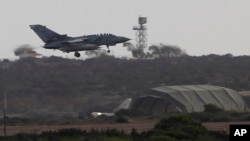Airstrikes hit three oil refineries near Syria's border with Turkey early Sunday in the ongoing offensive against Islamic State militants.
The Britain-based Syrian Observatory for Human Rights said the attacks occurred shortly after midnight, adding that they also hit a plastics factory.
Islamic State fighters, which have taken over parts of Syria and Iraq in recent months, have control over oil produced in eastern Syria and have set up small, makeshift refineries to distill the crude into fuel, one of their main sources of income.
A U.S.-led military coalition has targeted similar facilities in the last week to stop the flow of oil production revenue to the group.
The U.S. Defense Department said coalition warplanes on Saturday also struck a northern Syrian town that has been under militant siege for nearly two weeks.
Syrian diplomat
Also on Sunday, Syrian Information Minister Omran al-Zoubi said a recent United Nations resolution criminalizing foreign fighters is a "political victory" for Syria.
Washington has insisted that the air campaign against Islamic State fighters that began last week would not benefit the Syrian regime, now three years into a civil war.
But Zoubi told reporters in Damascus on Sunday that the U.S.-initiated Security Council resolution that bans travel to fight with religious extremists is a positive for the country.
"Without any doubt today everything is better than it was before, on the ground and in politics. It is better than before, not the ultimate best, but better than before," Zoubi said.
Besieged Syrian town
Activists and Kurdish officials said Islamic State fighters fired rockets into the town, known both as Kobani and Ain al-Arab. At least 12 people were reported wounded in the rocket attacks, while no immediate casualty estimates were released for the coalition strikes.
The Islamic State fighters' siege at Kobani has sent 160,000 refugees streaming into Turkey, while hundreds of Kurdish fighters inside Turkey have crossed into the Syrian town to defend it.
The United States and five Arab countries targeted militants in Syria for the first time on Sept. 23 - weeks after Washington launched an air campaign against Islamic State fighters in Iraq.
But the impact of the strikes on the group's capabilities was not immediately clear. Islamic State fighters have gained sympathy from many Islamists after the attacks, including from rival groups.
Scores of fighters have left al-Qaida's Nusra Front and other Islamist groups in Syria to join the Islamic State group since the airstrikes started.
The Sunni-aligned extremist group has declared an Islamic "caliphate" in northwestern Iraq and eastern Syria - a vast area where Islamic State fighters have beheaded Western hostages and ordered Shi'ites and non-Muslims to convert or die.
Turkish border
Turkish military personnel stood guard near the Turkey-Syria border on Sunday as Syrian refugees continue to flee from Islamic State militants.
Kurdish activists resident in Turkey have been gathering at the Mursitpinar border gate in Sanliurfa province to help the Syrian refugees, but they were turned away on Sunday morning as poor weather conditions led to the closure of the crossing.
The Turkish Disaster and Emergency Management Presidency have supplied buses to help transfer Syrian refugees across the border.
Also on Sunday, Britain's Defense Secretary Michael Fallon said armed British warplanes are flying daily missions over Iraq and would launch airstrikes if called in by local forces on the ground.
Royal Air Force Tornado GR4 combat jets have been flying from Britain's RAF Akrotiri sovereign base on Cyprus loaded with Paveway IV laser-guided bombs.
"They are flying daily over the area where the fighting is and they are ready as part of the international force to be called in by the ground troops if they can help directly with some of the fighting," Fallon said.
Some information for this report provided by Reuters, AP and AFP.





